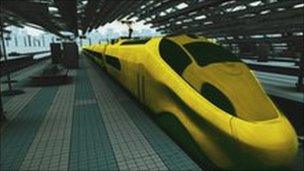Our high speed rail future
- Published
- comments
Will the HS2 high speed rail project, with its £32bn price tag, add up to a good deal for Britain's economy?
That was the question I addressed in a Newsnight film last night. But here's another question - what was a technology correspondent doing reporting on a transport story?
The answer is that many of the arguments for and against this project depend on how you see the future of our working lives, and what impact technological change may have on all of us over the next couple of decades.
Will we be speeding from one end of Britain to the other in a couple of hours on Japanese-style bullet trains, our economy transformed by the productivity boost we get from not wasting so much time travelling?
Or will we not need to leave home because we can meet up with friends and colleagues via video conference technology so advanced that it will feel as though we are in the same room?
In other words, the choice appears to be between high speed trains and high speed broadband as the key to faster growth.
Connected future
The case for HS2 depends partly on the idea that time spent on the train is unproductive, so that if you can make the journey shorter there will be big productivity gains for the economy.
The government document setting out the cost/benefit analysis puts the value of that time saving at £7.3bn by 2043 - and that's just for the section running from London to Birmingham.
But when I got on a train at Birmingham International, I found plenty of passengers - in First Class at least - who appeared to disprove that theory.
With free wi-fi on the train, they were hunched over their laptops and smartphones, busy working rather than idling away the journey.
"It's like the office in some ways," one passenger, Brian Lewis, told me:
"I'm on the internet so I'm connected with the office so I'm doing some work, preparing for meetings, reflecting on meetings or doing some expenses even. But it's not dead time."
If the HS2 project does go ahead the journey to London will be cut to just 49 minutes by 2026.
But the passengers I met did not seem too excited by that - Roisif Wilson, who spends some of the week shuttling between offices in Birmingham, was not convinced that the money would be well spent.
"We use the internet for conference calls anyway," she said. "We're living in a much more technological age and I think it would be good to invest in better wi-fi for more people. It's not a significant enough difference for the investment."
To get a glimpse of the way we all may work a few years from now, we visited Matt Millar at his home in Thame in Oxfordshire, a few miles from the proposed HS2 route.

The new line - and high-speed trains - would cut the London to Birmingham journey time to 49 minutes
We found him running his small software company and talking to four colleagues spread across South East England, all from his computer.
I asked his team, gathered on a Skype video call, whether they wanted fast broadband or fast trains.
A good internet connection seemed to be the priority - although one person called for high speed broadband on high speed trains.
That argument did not wash with one of HS2's most fervent supporters, Pete Waterman. The record producer, who commutes three times a week from his Warrington home to his London studio down the West Coast mainline, is passionate and knowledgeable about the railways.
Leap of faith
Broadband, he told us, only made money for the telephone companies, it did not produce jobs, while HS2 would deliver employment and an economic boost right across the country. "Build it and they will come," he insisted.
And Professor David Begg, who is rallying support amongst the business community for HS2, said the vision of a connected future where we did not need to travel had been oversold.
"In the last decade we've probably had the fastest rate of technological progress that we've ever seen and yet we've seen a 50% increase in rail travel," he explained.
"New forms of communication bring people into contact with so many more people - and they actually want to go and meet them!"
The economics of high speed rail seem to depend on an awful lot of unknown unknowns. Even its biggest fan Pete Waterman says "the numbers never add up for railways. If you're going to do figures don't do your railway. You can sit down and make 50 arguments for, you can make 50 arguments against."
But, he says, look back into history. "Every time they built a railway, the country changed for the better."
Predicting the impact of technology on society is a mug's game. Look back 25 years, and who was forecasting the rise of the internet - or the resurgence of rail?
So in the end it may come down to a leap of faith, rather than a rigorous analysis of how reduced journey times and less congestion on the roads weigh up against the cost to the public purse and the potential damage to the environment.
If, however, you want some further reading matter to bolster your arguments for or against HS2, click on the links below.
This is the Department for Transport's assessment , externalof the economic case.
Here's an assessment for the Transport Select Committee carried out by the Oxera consultancy, external.
And here's the Institute of Economic Affairs, a free market think tank, demolishing the business case, external.